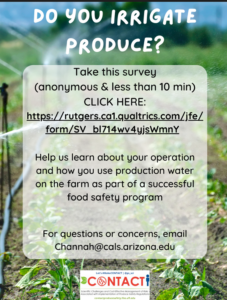USDA has just announced that proposed audit fees for the Harmonized and GAP/GHP audits will increase to $155 per hour. The average Harmonized Audit runs anywhere from 12 to 15 hours, GAP/GHP audits average 5 to 10 hours. The current fee is $132 per hour. For anyone who needs an audit try to schedule before October 1, 2023 when the new rates take effect. For further information or discuss the proposed increases contact: Melissa Bailey, Associate Administrator, AMS, USDA, Room 2036–S, 1400 Independence Ave. SW, Washington, DC 20250; telephone (202) 205–9356, or email melissa.bailey@usda.gov.
Commercial Ag Updates + Farm Food Safety
Rutgers Cooperative Extension Ag Agents provide updates on what they see in the field, upcoming events, and other important news that affects your operation, such as developments in on-farm Food Safety. Subscribe if you wish to be notified about workshops, meetings, and upcoming commercial ag events.
Subscriptions are available via EMAIL and RSS.
United States Department of Agriculture (USDA) Changes to Audit Costs
Fruit and Vegetable Grower Feedback Needed on Produce Safety Costs, Needs, and Barriers
|
|
Application for Cost-Share Grant Funding for Installation of Deer Fencing on UNPRESERVED Farmland – Out NOW
“The NJDA Deer Fencing Program makes cost-sharing funding available for the installation of deer fencing on unpreserved farms. The program is conducted in accordance with N.J.S.A 4:40-6.1.”
Please click here for the full application, eligibility, and other important information
Timing is important if considering this program. NJDA began accepting applications on 5/15/23.
North Jersey Tree Fruit Twilight Meeting I
North Jersey Tree Fruit Twilight Meeting I
May 3, 2023
5:00 PM-7:30 PM
Melicks Town Farm
19 King Street Oldwick, New Jersey 08858
5:00 PM – Registration / Light Refreshments
5:15 PM –Begin to load into wagons for the farm tour and educational talks
5:20 PM –Updates from the Blueberry and Tree Fruit IPM program
Carrie Manuse, Agriculture and Natural Resources Sr. Program Coordinator
Kaitlin Quinn, North Jersey Fruit IPM Program Associate, Rutgers Cooperative Extension of
Hunterdon County
5:40 PM –Apple Fruit Rots
Norm Lalancette PhD, Associate Specialist in Tree Fruit Plant Pathology Rutgers NJAES
6:10 PM –Vegetable Insect Pest and Disease Updates
Kris Holmstrom, IPM Program Associate, Vegetable
6:30 PM – Pesticide Safety, and Compliance
Patricia Hastings, Extension Pesticide Safety Education Program Coordinator for Rutgers NJAES
The following pesticide credits will be awarded
2 CORE 2 CAT 1A 3 CAT 10 2 CAT PP2
Please RSVP to Kim Crommelin at 908.788.1338 or kfrey@co.hunterdon.nj.us by May 2, 2023
Your Input Needed on Preharvest Water use in Produce
Do you irrigate produce?
Have questions about Subpart E or agricultural water?
The On-Farm Food Safety Team is involved in a national survey to find out:
- Does the produce industry understand the rule?
- What areas of the rule are still unclear to the industry.
- How preharvest water is used and treated on farms across the U.S.
This survey will help us get a better understanding of what you know and how extension educators can assist the industry. Please take a few minutes and fill out the survey by clicking on the image to the right.
NJ Department of Environmental Protection Issues Burn Permit for Frost Protection – Through April 14
(TRENTON) – With the state expected to experience colder spring temperatures, the Department of Environmental Protection has agreed with NJ Dept of Agriculture Secretary Douglas Fisher’s request to allow farmers to do controlled open burning or use specialized torches known as smudge pots to protect crops from damage beginning Friday, April 7, through Friday, April 14.
These cold events could adversely affect some of the fruit, vegetable, and floriculture crops.
Note: The NJDEP and New Jersey Forest Fire Service caution all farmers and agriculture businesses with respect to the use of open burning in high wind velocity conditions. Please take note that farmers are encouraged to utilize smudge pots is warming as necessary during higher wind conditions. Use of open burning when wind velocity is greater than 5mph is strictly prohibited, may contribute to wildfire risk, and can carry significant penalties. [Read more…]
